

As part of his $91-billion budget released Feb. 16, legalizing cannabis would generate more than $165 million annually for Wisconsinites, beginning in the second year of the biennium, Evers announced in a statement. Under the governor’s proposal, that money would increase revenue, create jobs and reduce costs associated with the state’s criminal justice system. The proposal also includes legalizing medical cannabis.
But two days after the 717-page budget was released by the Democrat executive, it was met with scrutiny by two key Republicans who control the majority in both chambers of the state legislature. During a virtual luncheon hosted by WisPolitics.com, an online magazine and news service covering political and governmental news in Wisconsin, Rep. Mark Born and Sen. Howard Marklein slammed Evers’ inclusion of cannabis legalization in the budget.
Born and Marklein are the co-chairs of the Joint Finance Committee (JFC), meaning they hold the fiscal keys as two of the most important decision-makers in the state Capitol. The committee members will spend the next few months rewriting the governor’s budget, with their version going to the Assembly and the Senate for a vote—Republicans own a 60-plus-percent majority in both chambers.
“Well, [cannabis legalization is] a huge issue; huge topic that I don’t believe should be included in the budget,” Marklein said. “It’s a significant enough policy change that that topic needs to be debated in the light of day on its own. I’ve heard from my sheriffs, my healthcare professionals, social workers, we’ve heard from representatives and legislators in Colorado on this topic, and it’s a big policy shift, and I just believe it’s too big to be inserted into the state budget.”
Piggybacking on those comments, Born said, “This is a major thing that has a lot of stakeholder groups on both sides. The senator just mentioned some of them. So, obviously we do public hearings on the budget, but they are on a lot of issues and they’re time limited because of how many things we have to dive into. These are big, broad discussions, and this is just one example of many of them that the governor put into this budget where it doesn’t belong.”
The gubernatorial-legislative strife on cannabis legalization isn’t new in Wisconsin. When Evers proposed decriminalizing adult-use cannabis and legalizing medical cannabis two years ago, it was rejected by the state’s Republican-controlled legislature.
Earlier in the virtual interview last week, both Born and Marklein said they had concerns with Evers’ 2021-23 budget proposal in its entirety.
“Sen. [Marklein] and I sent a letter to the governor saying, ‘Here’s a way we can work on a budget together: don’t include a bunch of divisive policy that doesn’t belong; don’t include huge tax increases; don’t go on a massive spending spree like you did last time,’” Born said. “And then he did all three of those things. So, we are kind of in a similar spot from where we were last time, or I would say even worse—even higher spending, more taxes and more divisive policy.”
While Born and Marklein are new as co-chairmen of the JFC, they are not new to being members of that committee. Marklein said this is the fourth budget proposal he will dissect.
“As we’ve gone through, preliminarily, the governor’s budget, I guess I would characterize his budget as a liberal’s dream,” Marklein said. “And that includes not just the spending side of things, but also all of the policy items that are in there.”
Born and Marklein said they have yet to decide whether they will start their rewrite with the governor’s budget or a base budget, like they did two years ago. Born said they’ll probably head toward the latter avenue and build from there.
While cannabis legislation is not likely to move forward in Wisconsin’s biennial budget, a 2019 Marquette University Law Poll found that 59% of Wisconsin voters supported adult-use legalization and 83% supported legalizing medical cannabis with a doctor’s prescription.
“Legalizing and taxing marijuana in Wisconsin—just like we do already with alcohol—ensures a controlled market and safe product are available for both recreational and medicinal users and can open the door for countless opportunities for us to reinvest in our communities and create a more equitable state,” Evers said in a statement about his proposal. “Frankly, red and blue states across the country have moved forward with legalization and there is no reason Wisconsin should be left behind when we know it’s supported by a majority of Wisconsinites.”
Under the governor’s proposal, Wisconsin would join 15 other states, including neighboring Michigan and Illinois, in legalizing adult-use cannabis.


























